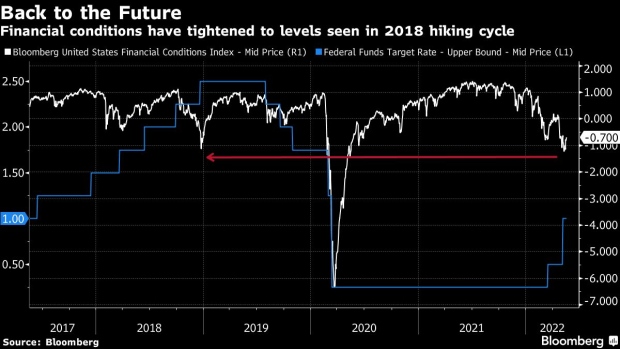May 17, 2022
U.S. stocks rally; treasury curve flattens on U.S. Fed
, Bloomberg News
We are on the verge of a very serious global recession: Mark Yusko
U.S. stocks regained session highs as investors weighed comments from U.S. Federal Reserve Chair Jerome Powell on the outlook for higher interest rates. Short-term Treasuries underperformed, extending a flattening in the yield curve.
The S&P 500 rose to the highest closing level in more than a week amid a broad-based rally, with all 11 major industry groups advancing. The Nasdaq 100 jumped more than two per cent, as Apple Inc., Tesla Inc. and Nvidia Corp. bounced back from a tech-led selloff Monday.
Treasury yields climbed Tuesday, with more policy-sensitive front-end tenors leading the way higher reflecting expectations for a series Fed rate hikes, as Powell said the central bank won’t hesitate to raise rates above neutral if needed. No one should doubt the U.S. central bank’s resolve to curb the highest inflation in decades, Powell said. He also noted that financial conditions have tightened quite a bit.
“The market is in the middle of a powerful moment where it’s digesting a major and relatively rapid change in expectations for monetary policy and what financial conditions should look like to keep inflation under control,” Lauren Goodwin, economist and portfolio strategist at New York Life Investments, said by phone. “And so we’ve already seen a lot of tightening in market financial conditions.”

Earlier, St. Louis Fed President James Bullard, a hawk and U.S. Federal Open Market Committee voter, said he backs the central bank’s plan to hike interest rates in half-percentage-point steps -- moves that are already reflected in rates markets for the upcoming three FOMC meetings.
Risk sentiment caught a tailwind Tuesday after data showed U.S. retail sales grew at a solid pace last month, the latest evidence that consumers remained resilient in the face of inflation and higher rates. Another report showed factory production rose at a solid pace for a third month in April.
The dollar stayed lower, weakening against all of its Group-of-10 counterparts except the yen, while European currencies led gains. The risk mood in Europe got a lift from data showing the economy in the euro area expanded more than initially estimated at the start of the year, defying headwinds from the early days of the war in Ukraine.
Commentary
- “Retail sales were much stronger than expected, especially including revisions,” said Dennis DeBusschere, the founder of 22V Research. “This has been a worry of ours -- the consumer staying too hot for the Fed. The consumer momentum and strength has been much stronger than just about anyone would have thought.”
- “The takeaway from this morning’s retail sales print was confirmation that spending during the second quarter has started on solid footing,” wrote BMO’s Ian Lyngen.
- “Inflation may be weighing down market sentiment and causing concern for the Fed, but it doesn’t seem to be slowing down the consumer at the moment,” said Mike Loewengart, managing director of investment strategy at E*Trade from Morgan Stanley. “That’s not to say that higher prices won’t start to creep into these numbers. After all we did see a decline month over month. And with a mixed bag on the retail earnings front today, it remains to be seen how investors will digest this read on the consumer.”
- “Going into ‘23, ‘24, yeah there’s a recession out there somewhere but I don’t see that in the near-term,” Scott Clemons, chief investment strategist at Brown Brothers Harriman, said on Bloomberg TV. “The backdrop is just too strong.”
Stocks briefly dipped to session lows in morning trading amid reports that New York City raised its COVID-19 alert level to high amid increasing pressure on the health care system, a move that it signaled Monday could be imminent.
On the corporate front, Citigroup Inc. jumped after report showed Warren Buffett’s Berkshire Hathaway took a stake in the lender. Walmart Inc. tumbled after cutting its profit outlook due to inflationary pressures. Boeing Co. rose after the Wall Street Journal reported that the black box for a China Eastern Airlines Corp. jet suggested the plane took an intentional nosedive.
U.S.-listed Chinese tech stocks jumped Tuesday, after a state television report that top officials reaffirmed support for internet companies. JD.com Inc., China’s second-largest e-commerce operator, rose after revenue growth beat estimates.
Meanwhile, Shanghai reported three days of zero community transmission, a milestone that could lead officials to start unwinding a punishing lockdown. Flareups elsewhere in China showed how hard it is to tackle the omicron strain.
Cryptocurrencies weathered the latest stablecoin turbulence, with Bitcoin rising above the US$30,000 mark. Oil hovered around US$114 a barrel in New York amid news that the US government will allow Chevron Corp. to negotiate its oil license with Venezuela.
What to watch this week:
- G-7 finance ministers and central bankers meeting Wednesday
- Eurozone, UK CPI Wednesday
- Philadelphia Fed President Patrick Harker speaks Wednesday
- China loan prime rates Friday
Some of the main moves in markets:
Stocks
- The S&P 500 rose two per cent as of 4 p.m. New York time
- The Nasdaq 100 rose 2.6 per cent
- The Dow Jones Industrial Average rose 1.3 per cent
- The MSCI World index rose two per cent
Currencies
- The Bloomberg Dollar Spot Index fell 0.7 per cent
- The euro rose 1.1 per cent to US$1.0545
- The British pound rose 1.3 per cent to US$1.2482
- The Japanese yen fell 0.2 per cent to 129.38 per U.S. dollar
Bonds
- The yield on 10-year Treasuries advanced 10 basis points to 2.98 per cent
- Germany’s 10-year yield advanced 11 basis points to 1.05 per cent
- Britain’s 10-year yield advanced 15 basis points to 1.88 per cent
Commodities
- West Texas Intermediate crude fell 1.9 per cent to US$112.06 a barrel
- Gold futures were little changed





